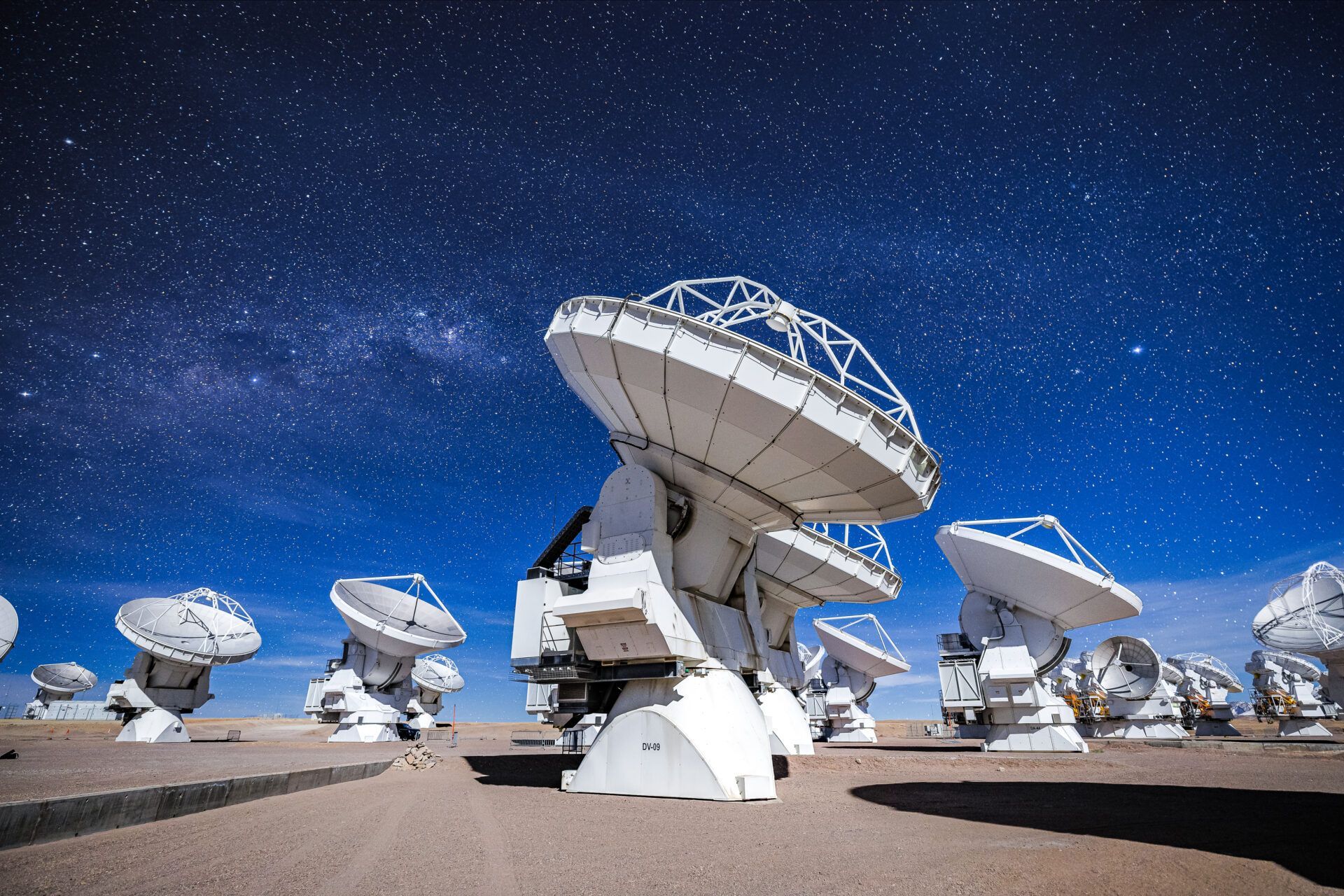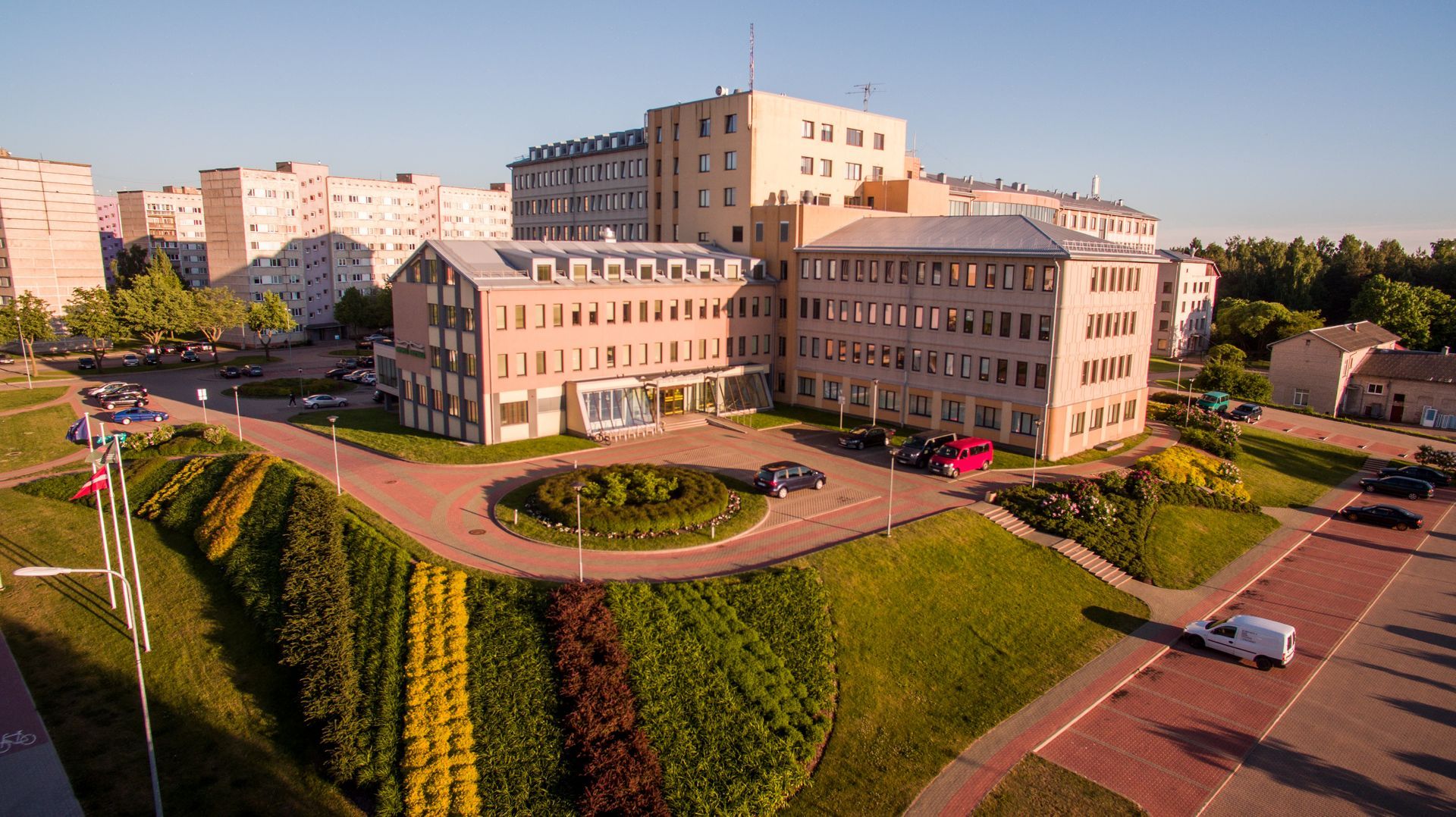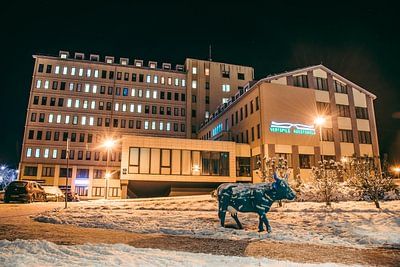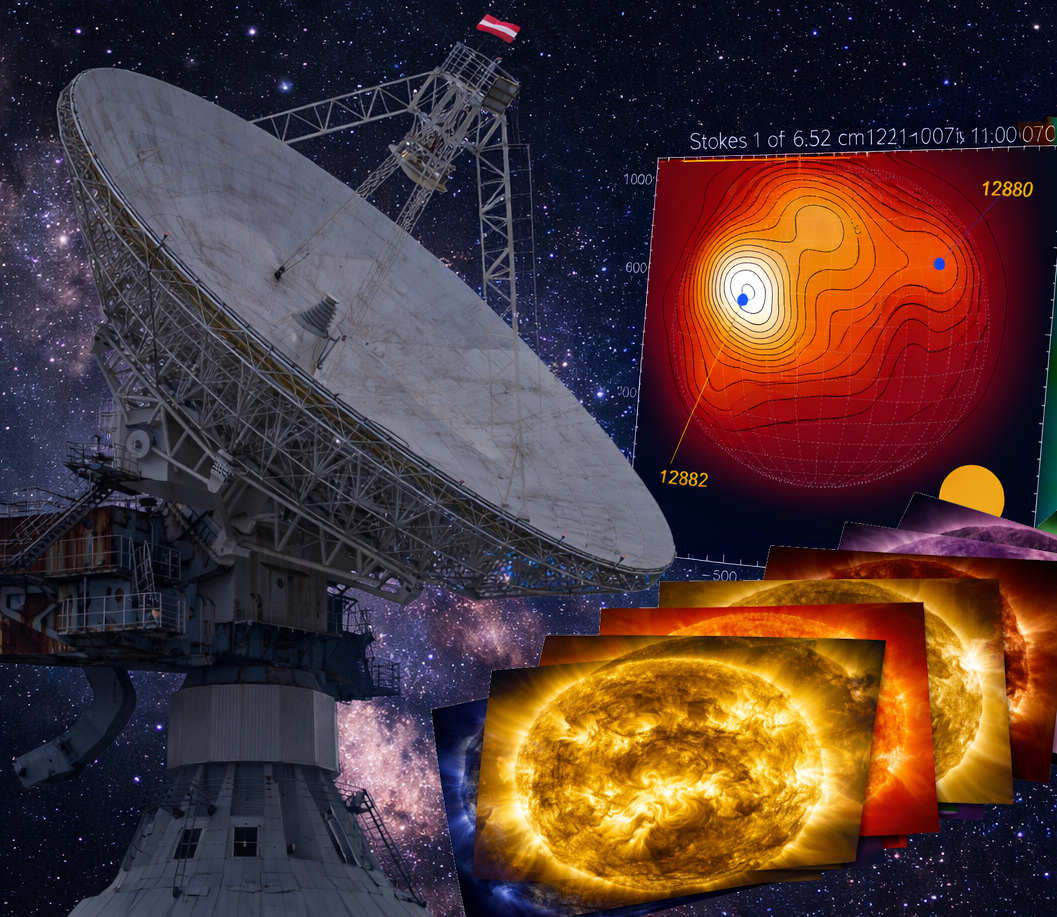Explore Nine Countries from Your Desk – Join the COLOURS Virtual Journey Week!
About the event
From November 18 to 22, students and staff of COLOURS partner universities are invited to embark on an interactive, virtual journey through nine different countries. This exciting Virtual Journey Week will provide participants with unique digital experiences, including language cafés, taster courses, quizzes, and engaging video clips, showcasing the diversity of the Alliance’s universities, cultures, and languages.
In a relaxed, friendly atmosphere, attendees can participate in discussions in various languages, connect with students and colleagues from across Europe, and exchange insights on cultural and academic topics. Student representatives will be available to answer questions, and Erasmus students will share their personal experiences, offering a first-hand glimpse into the world of international study.
Whether you’re looking to expand your cultural knowledge, meet new friends, or simply enjoy a week of digital exploration, Virtual Journey Week is the perfect opportunity to engage with the COLOURS Alliance community—all from the comfort of your own desk! Don’t miss this chance to explore, connect, and be inspired.
| Morning | Afternoon | |
|---|---|---|
| Monday, November 18th | Opening Session, France – Le Mans Université | Germany – Paderborn University |
| Tuesday November 19th | Poland – Jan Dlugosz University | Croatia – Sveučilište Josipa Jurja Strossmayera u Osijeku |
| Wednesday November 20th | Spain – Universidad de Castilla-La Mancha | Italy – Università degli Studi di Ferrara |
| Thursday November 21st | North Macedonia – Univerzitet "Sv. Kliment Ohridski" | Sweden – Kristianstad University |
| Friday November 22nd | Latvia Ventspils – University of Applied Sciences | Closing Session |
Whom?
Everyone is welcome!
Students, staff and teachers of the COLOURS universities are a given. But it doesn’t mean others can’t join, quite the opposite!
Where?
Everything will happen online!
You’ll be able to tour 9 countries from the comfort of your home, by following this link.
On the BloomHub platform, VUAS users can log in with their LAIS username and password.
Please note:
- If you have eduGAIN credentials, you’ll be able to access the platform right away.
- If you do not, please contact the following email address by Wednesday, November 13th to get some credentials.
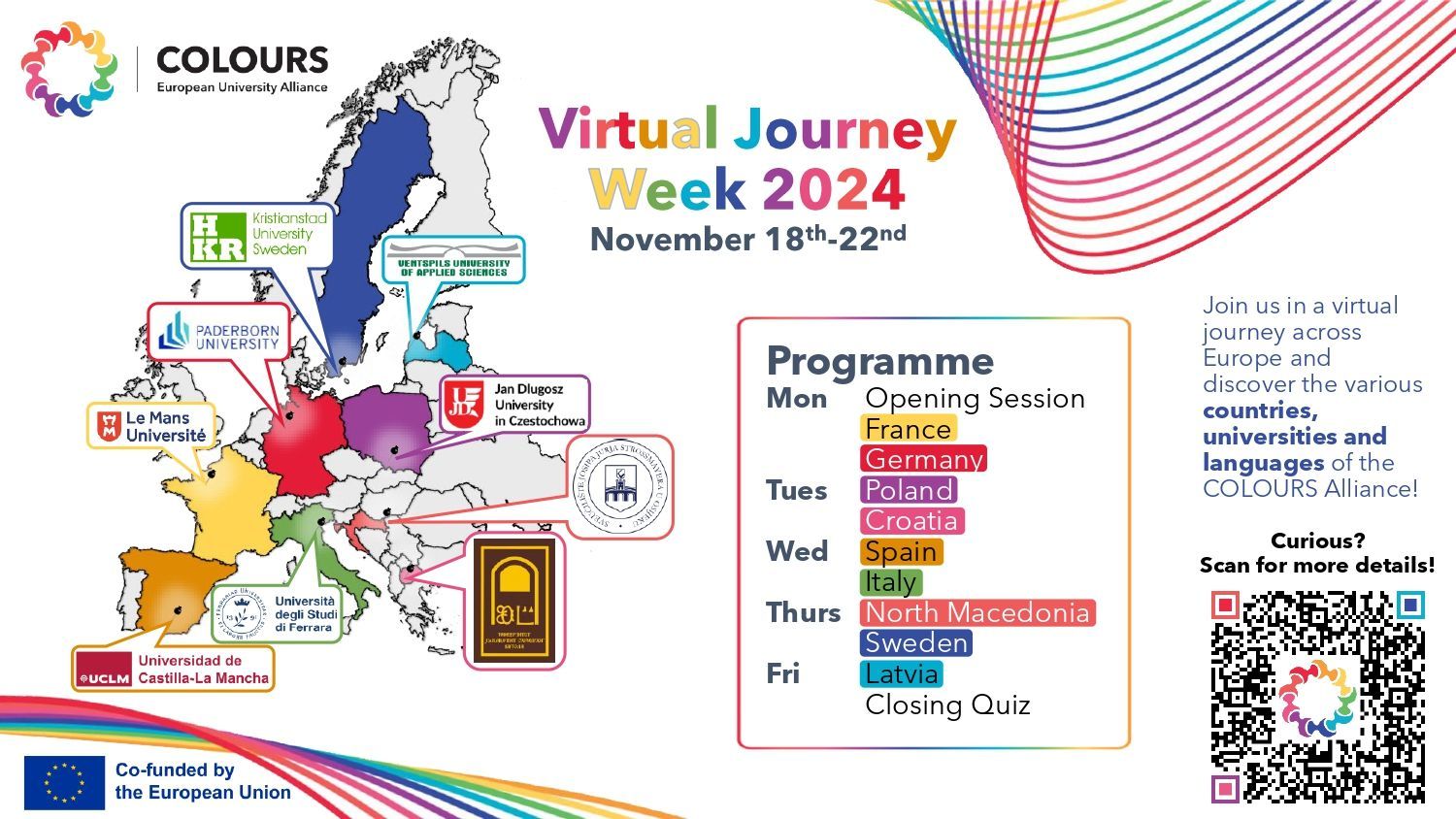
Detailed Programme
Monday, November 18th
| Live events | Available until Monday 25th | ||
|---|---|---|---|
| Opening session | 9-9:30am (CET) | Welcome event (Zoom, English A2~) | Recording of the event |
| France – Le Mans Université | 10-10:30am (CET) | French Crash Course / Découverte du français (Zoom, No requirement) | From 9:30am Videos, quizzes and more (various language requirements) |
| 11-11:30am (CET) | Café de langue en français (Zoom, French A2~) | From 9:30am Videos, quizzes and more (various language requirements) | |
| 12-12:30pm (CET) | ERASMUS Students Present Their Experience at LMU (Zoom, English A2~) | From 9:30am Videos, quizzes and more (various language requirements) | |
| 1-1:30pm (CET) | French Crash Course / Découverte du français (Zoom, No requirement) | From 9:30am Videos, quizzes and more (various language requirements) | |
| Germany – Paderborn University | 3-4pm (CET) | Student Life in Paderborn – local students answer your questions (Zoom, English B1~) | From 1pm Videos, quizzes and more (various language requirements) |
| 4-5pm (CET) | Sprachcafé Deutsch (Zoom, Deutsch B1~) | From 1pm Videos, quizzes and more (various language requirements) | |
| 4-5pm (CET) | A glimpse of German: a sample lesson for beginners (Zoom, No requirement) | From 1pm Videos, quizzes and more (various language requirements) | |
| 5-6pm (CET) | Erasmus in Paderborn – students share their experience (Zoom, English B1~) | From 1pm Videos, quizzes and more (various language requirements) |
Tuesday, November 19th
| Live events | Available until Monday 25th | ||
|---|---|---|---|
| Poland – Jan Dlugosz University | 10am-12pm (CET) | Polish Basics: Beginner Crash Course (Zoom, No requirement) | From 9:30am Videos, quizzes and more (English B1~) |
| 10am-12pm (CET) | Cultural Exchange: Erasmus Student Reflections on Life in Poland and Studying at JDU (Zoom, English B1~) | From 9:30am Videos, quizzes and more (English B1~) | |
| Croatia – Sveučilište Josipa Jurja Strossmayera u Osijeku | From 2pm Discover Josip Juraj Strossmayer University of Osijek (Croatian B1~ / English B1~) | ||
| Walking Osijek (English B1~) | |||
| The ABC of Croatian (English B1~) | |||
| Osijek - Essek und sein(e) Deutsch(en) (German B2~) | |||
| Mała lekcja polskiego w Osijeku / Mala lekcija poljskog jezika u Osijeku (Polish A1-A2 / Croatian A1-A2) | |||
| Experiences of Incoming Erasmus+ Students (English B1~) |
Wednesday, November 20th
| Live events | Available until Monday 25th | ||
|---|---|---|---|
| Spain – Universidad de Castilla-La Mancha | 10-10:30am (CET) | Welcome to the University of Castilla-La Mancha (Teams, English B1~) | From 9:30am Videos, quizzes and more (no language requirements) |
| 10:45-11:30am (CET) | Forum: COLOURS Experiences, Opportunities and Challenges at the University of Castilla-La Mancha (Teams, English B1~) | From 9:30am Videos, quizzes and more (no language requirements) | |
| 11:45am-1:00pm (CET) | Iniciación a la lengua española (Teams, English B1~) | From 9:30am Videos, quizzes and more (no language requirements) | |
| Italy – Università degli Studi di Ferrara | 2-3:15pm (CET) | Piacere! This is UniFe, let’s get to know each other (Google Meet, Italian A2~ / English B1~) | |
| 3:30-5pm (CET) | I tesori di Ferrara. Discover the treasures of our Renaissance city as you learn some basic vocabulary (Google Meet, English B1~) |
Thursday, November 21st
| Live events | Available until Monday 25th | ||
|---|---|---|---|
| North Macedonia – Univerzitet "Sv. Kliment Ohridski" | 10am-12pm (CET) | Macedonian for foreigners (Google meet, No requirement) | From 9:30am Videos and more (various language requirements) |
| Sweden – Kristianstad University | From 1pm Discover Kristianstad (English A2~) | ||
| Swedish language and the languages of Sweden (English B2~) | |||
| Discover Swedish Sayings and Idioms! (English B1~) |
Friday, November 22nd
| Live events | Available until Monday 25th | ||
|---|---|---|---|
| Latvia – Ventspils University of Applied Sciences | 9AM- 11AM (CET) | Latvian language and culture https://bbb.venta.lv/b/rut-yr7-dio-4rq | From 9:30am Videos, quizzes and more (various language requirements) |
| Closing Session | 11:15-11:45am (CET) | Thank you for attending! (Zoom, English A2~) | From 11am Survey (English A2~) |


Share on other platforms
Other news


